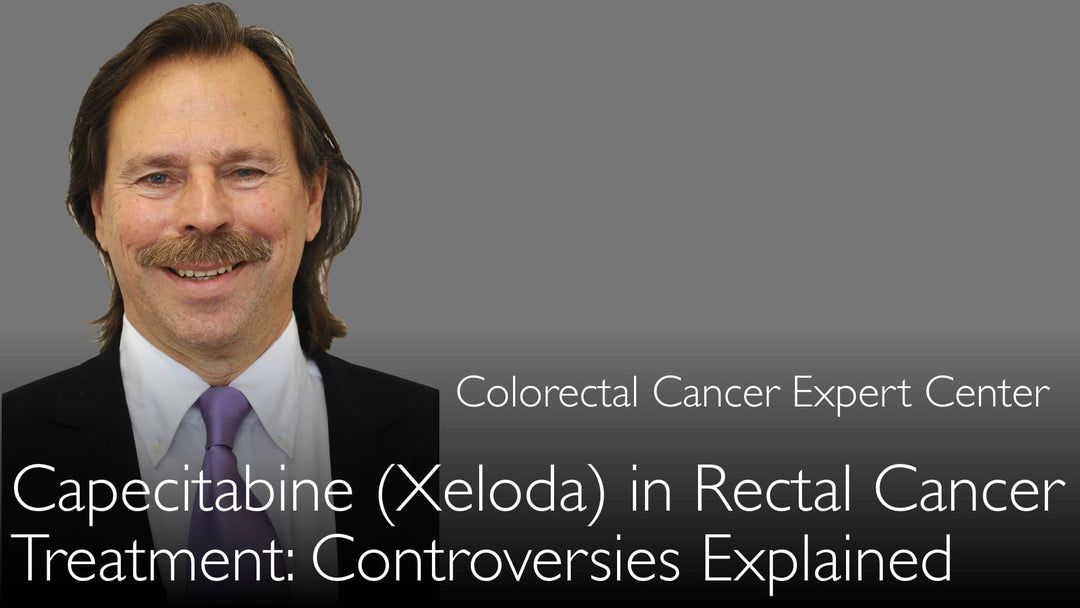Leading expert in colorectal cancer, Dr. Hans-Joachim Schmoll, MD, explains the role of chemotherapy in rectal cancer treatment. He details how chemotherapy and radiotherapy can sometimes eradicate tumors before surgery. Dr. Hans-Joachim Schmoll, MD, discusses the use of capecitabine (Xeloda) and oxaliplatin with 5-FU. He highlights the current controversy surrounding the addition of oxaliplatin to rectal cancer chemotherapy regimens. Dr. Hans-Joachim Schmoll, MD, also outlines the significant risk of death from locally advanced disease.
Rectal Cancer Chemotherapy: Capecitabine, Oxaliplatin, and 5-FU Treatment Strategies
Jump To Section
- Rectal Cancer Overview and Risks
- Preoperative Chemoradiation Therapy
- Adjuvant Chemotherapy After Surgery
- The Oxaliplatin Controversy in Treatment
- Molecular Differences in Colorectal Cancer
- Clinical Trial Data and Evidence
- Full Transcript
Rectal Cancer Overview and Risks
Rectal cancer accounts for approximately 40% of all colorectal cancer cases. Dr. Hans-Joachim Schmoll, MD, emphasizes that this cancer is particularly dangerous due to its location in the pelvis. The tumor grows locally and regionally, making complete surgical removal more challenging. Patients with locally advanced rectal cancer face a significant mortality risk. The risk of death from locally advanced rectal cancer ranges from 25% to 35%.
Preoperative Chemoradiation Therapy
Combined modality therapy is a cornerstone of modern rectal cancer treatment. Dr. Hans-Joachim Schmoll, MD, explains that chemotherapy and radiation therapy are often administered before surgical operation. This neoadjuvant approach aims to shrink the tumor, making it more operable. The standard chemotherapy agent used in this setting is 5-Fluorouracil (5-FU). In some cases, this aggressive treatment can lead to a complete pathological response. Chemotherapy and radiotherapy can reduce and sometimes eradicate the rectal cancer tumor before surgery.
Adjuvant Chemotherapy After Surgery
Treatment continues after the surgical procedure to remove the cancer. Dr. Hans-Joachim Schmoll, MD, states that patients should also receive chemotherapy after surgery. This adjuvant chemotherapy is intended to eliminate any microscopic cancer cells that may remain. The goal is to reduce the risk of the cancer returning, both locally and at distant sites. The big question in oncology is whether this postoperative regimen should mirror that of colon cancer.
The Oxaliplatin Controversy in Treatment
A significant debate exists within the medical community regarding optimal chemotherapy combinations. Dr. Hans-Joachim Schmoll, MD, highlights the controversy over adding oxaliplatin to the treatment plan. The combination of oxaliplatin with 5-fluorouracil or its oral prodrug, capecitabine (Xeloda), is known as XELOX. This regimen is a standard of care in colon cancer and is endorsed by some guidelines for stage 2 and stage 3 rectal cancer. However, Dr. Hans-Joachim Schmoll, MD, notes a stark division among specialists. In Europe, approximately 50% of colorectal cancer doctors still prefer using 5-fluorouracil or capecitabine alone, without oxaliplatin.
Molecular Differences in Colorectal Cancer
The treatment debate is partly fueled by biological differences within colorectal cancers. During his discussion with Dr. Anton Titov, MD, Dr. Hans-Joachim Schmoll, MD, pointed out that rectal cancer is located in the lower part of the colon. There could be molecular differences between rectal cancer and colon cancer origins. A recognized feature is the genetic difference between cancers arising in the left and right parts of the large bowel. These molecular and genetic characteristics can influence tumor behavior and potentially response to therapy.
Clinical Trial Data and Evidence
The evidence base for adding oxaliplatin is still evolving. Dr. Hans-Joachim Schmoll, MD, references three recent clinical trials on rectal cancer treatment, including one he led. These trials, conducted in Europe, Australia, Germany, and Korea, showed that oxaliplatin added to 5-fluorouracil can reduce the rate of rectal cancer relapses. The combination chemotherapy also reduces death from rectal cancer. However, Dr. Schmoll provides a critical caveat: these clinical trials were relatively small. The total number of patients enrolled isn't big enough to definitively prove a major overall survival benefit for the oxaliplatin combination in rectal cancer.
Full Transcript
Dr. Anton Titov, MD: Chemotherapy in rectal cancer can lead to eradication of tumor without surgery. How to use Xeloda with other chemotherapy medications in rectal cancer treatment? What are controversial aspects of Xeloda treatment in rectal cancer?
I have already spoken about optimal treatment of colon cancer. But we also have rectal cancer. Rectal cancer is 40% of all colorectal cancer.
Dr. Hans-Joachim Schmoll, MD: Rectal cancer is more dangerous because it is growing locally and regionally in the pelvis. There is a 25% to 35% risk of death from locally advanced rectal cancer. Rectal cancer is often treated by chemotherapy and radiation therapy before surgical operation. 5-Fluorouracil is used for chemotherapy for rectal cancer.
Chemotherapy and radiotherapy can reduce and sometimes eradicate rectal cancer tumor before surgery. Patients with rectal cancer should also get chemotherapy after the surgery to remove rectal cancer.
Dr. Anton Titov, MD: The big question is whether chemotherapy in rectal cancer should be the same as in colon cancer. Rectal cancer is in a lower part of the colon. But there could be molecular differences between rectal cancer and colon cancer.
Dr. Hans-Joachim Schmoll, MD: For example, there is a difference in molecular and genetic characteristics between cancer in the left and right parts of the large bowel. Genetic difference in colon cancer at different locations is a recognized feature of colorectal cancer.
Dr. Anton Titov, MD: There were three different clinical trials recently on rectal cancer treatment. I have done one of them. It was a worldwide trial, in Europe and Australia and Germany.
Dr. Hans-Joachim Schmoll, MD: These clinical trials showed that oxaliplatin can be added to 5-fluorouracil in rectal cancer therapy. We know this chemotherapy works in colon cancer. This combination chemotherapy can reduce the rate of rectal cancer relapses. It reduces death from rectal cancer.
However, these clinical trials were small. One clinical trial was in Korea, one in Germany. I have done a larger European clinical trial on rectal cancer chemotherapy. But we are not sure whether oxaliplatin and 5-fluorouracil chemotherapy improves overall survival in rectal cancer. Because these trials aren't big enough.
The number of the patients in total isn't big enough to show that oxaliplatin and 5-fluorouracil chemotherapy has major benefits in rectal cancer treatment. Clinical guidelines for rectal cancer in Europe and in the United States say "yes". Oxaliplatin and 5-fluorouracil for stage 2 and stage 3 rectal cancer treatment.
Oxaliplatin can be added to capecitabine. It is called XELOX chemotherapy regimen. But in Europe, still 50% of colorectal cancer doctors say: "no, no, no, we only can use 5-fluorouracil or capecitabine alone, without adding oxaliplatin."
Dr. Anton Titov, MD: But other doctors say that rectal cancer chemotherapy should be done the same method as colon cancer chemotherapy. It is a little bit controversial now.
Dr. Hans-Joachim Schmoll, MD: But patients with rectal cancer should have a combination of chemotherapy after surgical operation. Chemotherapy with radiotherapy for rectal cancer before surgery is often used. Neoadjuvant capecitabine is a new standard in rectal cancer chemotherapy before surgical operation.
Capecitabine (Xeloda) is also used in patients with metastatic colorectal cancer. Rectal cancer is significant and often discovered in a locally advanced stage. There is a 25% to 35% risk of death from locally advanced rectal cancer.
Chemotherapy and radiotherapy can reduce and sometimes eradicate rectal cancer tumor before surgery. Clinical trials showed that oxaliplatin can be added to 5-fluorouracil in rectal cancer therapy. We can use oxaliplatin and 5-fluorouracil for stage 2 and stage 3 rectal cancer treatment.







